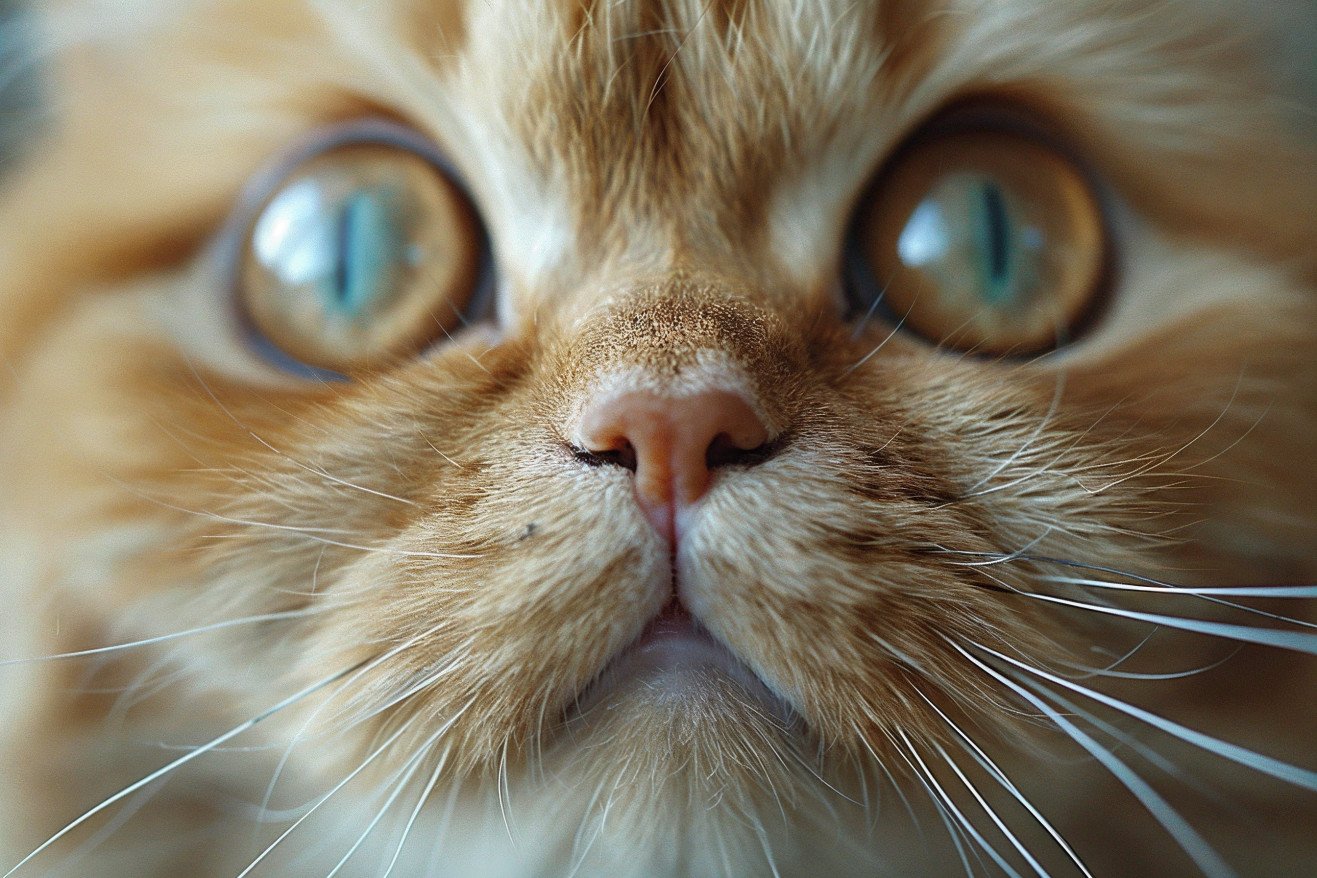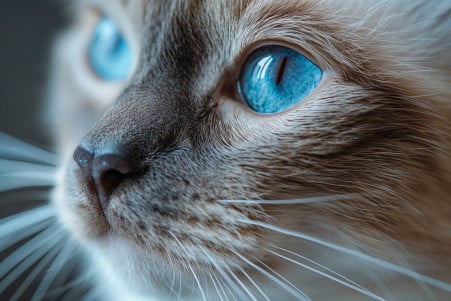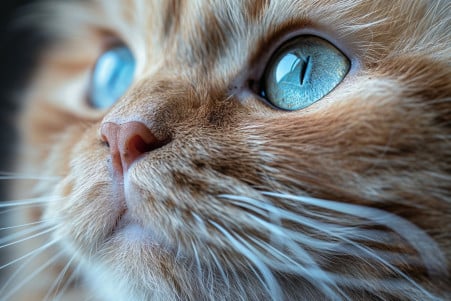Why Cutting a Cat's Whiskers Is Harmful: The Risks and Consequences
11 June 2024 • Updated 10 June 2024

Cutting a cat's whiskers can cause a variety of problems, including loss of balance, loss of spatial awareness, and even vision loss. This is why it's important to know what whiskers are and what they do. Whiskers are highly sensitive, specialized hairs that help cats with their spatial awareness, air detection, and ability to fit into small spaces - when they're cut, a cat's ability to understand and move through its environment is compromised.
To give you a complete picture of what happens when a cat's whiskers are cut, we will look at physiological research on the feline sensory system, veterinary studies on the potential health effects, and behavioral research on how cutting a cat's whiskers disrupts their natural instincts and behaviors. By looking at this topic from multiple angles, you will come away with an understanding of why these amazing sensory hairs are so important and why responsible pet owners should always prioritize their cat's health.
Is cutting a cat's whiskers harmful?
What Happens If a Cat's Whiskers Are Cut or Clipped?
Cutting or clipping a cat's whiskers is not recommended and can have serious consequences, including disorientation, confusion, and a significant loss of spatial awareness, according to veterinary professionals interviewed by Spot. Cats without their whiskers may have trouble determining the size of openings and spaces, moving around obstacles, and accurately judging distances.
Dr. Justine Lee notes that while the whiskers themselves aren’t innervated, they are innervated by the follicles and sinuses in which they are rooted and the extensive neural connections that surround them. When these structures are damaged or removed, it can cause pain, mental distress, and an increased risk of injury for the cat.
Even if a cat's whiskers are only temporarily clipped or damaged, they may experience anxiety, confusion, and changes in behavior until the whiskers grow back, which can take several months according to Hepper. In the most serious cases, if the follicle is permanently damaged, the whiskers may never grow back properly, leading to long-term sensory loss, according to the East Bay Times.
Because of the important role whiskers play in a cat's ability to interact with their environment and the potential for long-term damage, owners should never intentionally cut or clip their cat's whiskers. If a cat's whiskers are accidentally damaged, it should be taken seriously and the cat should be closely monitored until the whiskers have fully regrown to ensure they are comfortable and safe.
Whisker Communication: Decoding a Cat's Body Language
Cats use the position and movement of their whiskers to communicate their mood and emotional state. As the Cat Care Society explains, relaxed, neutral whiskers mean a relaxed and happy cat, while whiskers pushed forward mean a cat is curious or interested. Garlick City Kitty Rescue says that pulled-back whiskers can mean a cat is scared, aggressive, or ready to defend itself. Meanwhile, whiskers that are twitching or moving quickly can mean a cat is excited or in hunting mode, according to PetHelpful.
Learning to read a cat's whisker language is important for pet parents who want to better understand their cat's body language and actions, according to Waggle. By paying attention to the subtle changes in a cat's whiskers, pet parents can learn more about their cat's feelings and moods, which can help them build a closer relationship.
Whisker Care and Maintenance: How to Make Sure Your Cat's Whiskers Stay in Good Shape
The whiskers will fall out and grow back on their own as part of the cat's hair growth cycle, according to the McGehee Clinic for Animals. However, if a cat loses its whiskers or the whiskers become damaged, it can be a sign of a medical problem, such as skin conditions, allergies, or infections, according to Catster.
In addition, whiskers can be damaged or lost due to medications or treatments, according to PetMD. If you notice any problems with your cat's whiskers, it's important to take your cat to the vet to make sure there isn't a medical issue and to get the right treatment.
In general, a good diet, regular grooming, and a low-stress environment can help ensure that a cat's whiskers stay healthy, according to the Catster guide. By making sure your cat gets the care it needs and addressing any medical issues, you can make sure your cat's important sensory organs are in the best shape possible.
Exceptions: When Whisker Trimming Might Be Necessary
In very rare cases, a vet may suggest trimming or cutting a cat's whiskers for medical purposes, according to the McGehee Clinic for Animals. This could include removing foreign objects that have become stuck in the whiskers or trimming whiskers that have become matted or tangled, according to Catster. There may also be some medical procedures or treatments that require whisker trimming or removal.
In all cases, the whiskers should be trimmed very carefully, using the right tools and techniques to minimize pain and prevent damage to the hair follicles. However, as the Catster article stresses, pet parents should never trim or cut their cat's whiskers unless a vet has told them to and is there to supervise. These situations are very rare, and the potential risks of cutting a cat's whiskers incorrectly are much greater than the possible rewards.
Conclusion: Honor the Amazing Whiskers
Cat whiskers, or vibrissae, are highly specialized tactile hairs that are an essential part of a cat's daily life. These touch-sensitive sensors are deeply embedded in a cat's skin and connected to their nervous system, allowing them to collect important information about the world around them.
As Four Paws explains, whiskers help cats evaluate their environment, hunt, and move through small spaces by sensing even the smallest vibrations and air currents. Whiskers also help cats with their vision, as the information they collect helps cats determine distances and decide if they can fit through a space.
Whiskers may also be used to help cats communicate their feelings and intentions, according to Fear Free Happy Homes. A cat with whiskers in a relaxed, neutral position is feeling calm, while whiskers pulled back against the face indicate the cat is feeling fearful or aggressive.
Because of the many roles that whiskers play, it's important to never cut or damage them. As PetMD explains, trimming a cat's whiskers can lead to disorientation, confusion, and even safety hazards because cats rely on their whiskers to help them understand the world around them.
By learning about the many roles that whiskers play and making sure they are never cut or damaged, cat owners can help their pets live their best lives and deepen their relationships with their furry friends.


